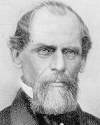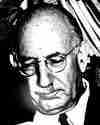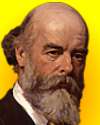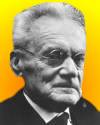 | TODAY IN SCIENCE HISTORY NEWSLETTER - 12 JUNE |
| Feature for Today |
 On 12 Jun 1806, a German-American engineer was born that you may be able to name in the quiz below. On 12 Jun 1806, a German-American engineer was born that you may be able to name in the quiz below.His mastery of the production and use of steel cables to build suspension bridges produced significant bridges, including the Brooklyn Bridge, still in use today. Yet he also left a legacy in the technique of building suspension bridges from which followed many more to the present day. So significant an engineer did not pass without note. The city of Trenton, New Jersey, dedicated a monument, a bronze statue, to him. A short biography of this engineer was included in the Introduction of a booklet printed to record the ceremony. |
| Book of the Day | |
| |
| Quotations for Today | |
 | "Since biological change occurs slowly and cultural changes occur in every generation, it is futile to try to explain the fleeting phenomena of culture by a racial constant. We can often explain them—in terms of contact with other peoples, of individual genius, of geography—but not by racial differences." |
 | "Men of Science would do well to talk plain English. The most abstruse questions can very well be discussed in our own tongue ... I make a particular appeal to the botanists, who appear to delight in troublesome words." |
 | "The discovery which has been pointed to by theory is always one of profound interest and importance, but it is usually the close and crown of a long and fruitful period, whereas the discovery which comes as a puzzle and surprise usually marks a fresh epoch and opens a new chapter in science." |
| QUIZ | |
| Before you look at today's web page, see if you can answer some of these questions about the events that happened on this day. Some of the names are very familiar. Others will likely stump you. Tickle your curiosity with these questions, then check your answers on today's web page. | |
| Births | |
 |  Sir Oliver Joseph Lodge, born on 12 Jun 1851, was a British physicist who perfected the coherer, a detector important in the early days of a new field of science. Sir Oliver Joseph Lodge, born on 12 Jun 1851, was a British physicist who perfected the coherer, a detector important in the early days of a new field of science. What did this coherer detect? What did this coherer detect? |
 |  This German-American engineer, born 12 Jun 1806, pioneered the design and construction of suspension bridges, including the Brooklyn Bridge. In 1831 he immigrated to Saxonburg, near Pittsburgh, Pa., and shortly thereafter was employed by the Pennsylvania Railroad Corp. to survey its route across the Allegheny Mountains. He then demonstrated the practicability of steel cables in bridge construction and in 1841 established at Saxonburg the first U.S. factory to manufacture steel-wire rope. He utilized steel cables in the construction of numerous suspension bridges including a railroad suspension bridge over the Niagara River at Niagara Falls (1851-55). He designed the Brooklyn Bridge but, while supervising preliminary construction operations, was injured and died. This German-American engineer, born 12 Jun 1806, pioneered the design and construction of suspension bridges, including the Brooklyn Bridge. In 1831 he immigrated to Saxonburg, near Pittsburgh, Pa., and shortly thereafter was employed by the Pennsylvania Railroad Corp. to survey its route across the Allegheny Mountains. He then demonstrated the practicability of steel cables in bridge construction and in 1841 established at Saxonburg the first U.S. factory to manufacture steel-wire rope. He utilized steel cables in the construction of numerous suspension bridges including a railroad suspension bridge over the Niagara River at Niagara Falls (1851-55). He designed the Brooklyn Bridge but, while supervising preliminary construction operations, was injured and died. Can you name this man? Can you name this man? |
| Deaths | |
 |  Karl von Frisch (1886-1982) was a zoologist whose studies of communication among certain life form added significantly to the knowledge of the chemical and visual sensors of insects and simple animals. He shared the 1973 Nobel Prize for Physiology or Medicine. He showed that the objects of his study have the ability to recognize different odours and tastes, and discovered their famous "waggle dance" used to communicate among with others. Karl von Frisch (1886-1982) was a zoologist whose studies of communication among certain life form added significantly to the knowledge of the chemical and visual sensors of insects and simple animals. He shared the 1973 Nobel Prize for Physiology or Medicine. He showed that the objects of his study have the ability to recognize different odours and tastes, and discovered their famous "waggle dance" used to communicate among with others.  What did he study that use the "waggle" dance? What did he study that use the "waggle" dance? |
| |  Ferdinand Zirkel (1838-1912) was a German geologist and pioneer in microscopic petrography. Ferdinand Zirkel (1838-1912) was a German geologist and pioneer in microscopic petrography.  What is petrography? What is petrography? |
| Events | |
 On 12 Jun 1979, a unique craft flew across the English Channel, an airplane powered solely by human power. Cyclist Bryan Allen used a pedalling mechanism. On 12 Jun 1979, a unique craft flew across the English Channel, an airplane powered solely by human power. Cyclist Bryan Allen used a pedalling mechanism. What was the name of this first airplane which was successful in human-powered flight? What was the name of this first airplane which was successful in human-powered flight? | |
 On 12 Jun 1933, the electrobasograph invented by Dr R. Plato Schwartz (1894-1965) of The Myodynamics Laboratory of the University of Rochester, N.Y., was first exhibited in the U.S. to the American Medical Association convention in Milwaukee, Wisc. On 12 Jun 1933, the electrobasograph invented by Dr R. Plato Schwartz (1894-1965) of The Myodynamics Laboratory of the University of Rochester, N.Y., was first exhibited in the U.S. to the American Medical Association convention in Milwaukee, Wisc. What did the electrobasograph measure? What did the electrobasograph measure? | |
 On 12 Jun of a certain year, the first animated cartoon made in the U.S. by modern techniques was released. John Randolph Bray invented and patented the process, producing a movie called The Artist's Dream (also known as The Dachsund) in which a dog eats sausages until it explodes. He patented many of his improvements on the animation process, realizing early on the business potential of these developments. One of these innovations was the use of translucent paper to make it easier to position objects in successive drawings. On 12 Jun of a certain year, the first animated cartoon made in the U.S. by modern techniques was released. John Randolph Bray invented and patented the process, producing a movie called The Artist's Dream (also known as The Dachsund) in which a dog eats sausages until it explodes. He patented many of his improvements on the animation process, realizing early on the business potential of these developments. One of these innovations was the use of translucent paper to make it easier to position objects in successive drawings. In what decade was this first animated cartoon made that used modern techniques? In what decade was this first animated cartoon made that used modern techniques? | |
| Answers |
When you have your answers ready to all the questions above, you'll find all the information to check them, and more, on the June 12 web page of Today in Science History. Or, try this link first for just the brief answers. Fast answers for the previous newsletter for June 11: minesweeper; zoologist; gunpowder; barometer; Franklin stove; chlorofluorocarbons as a propellant in spray cans. |
| Feedback |
 If you enjoy this newsletter, the website, or wish to offer encouragement or ideas, please send feedback by using your mail reader Reply button. If you enjoy this newsletter, the website, or wish to offer encouragement or ideas, please send feedback by using your mail reader Reply button. |
--
If you do not want to receive any more newsletters, Unsubscribe
To update your preferences and to unsubscribe visit this link


Δεν υπάρχουν σχόλια:
Δημοσίευση σχολίου